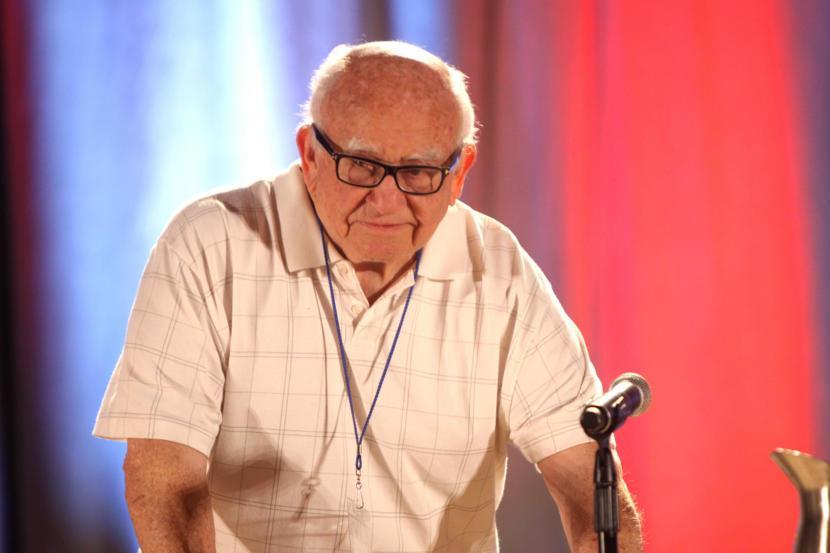Ed Asner Discusses Son and Grandson’s Autism
While Asner’s fame draws individuals in, it is also his willingness to talk openly and honestly about his son and grandson, as is his desire for them to realize their fullest potential.

Photo: Ed Asner by Gage Skidmore (flickr)
Seven-time Emmy award-winning actor and voice artist, Ed Asner, admitted that he did not see the signs that his youngest son, Charlie, had autism. The signs that others seemed to have noticed, including difficulty fitting in, lack of empathy, and lack of certain lagging skills. “I really found a high-spirited, rule-breaking youngster” said the father of four.
Charlie was diagnosed with high-functioning autism at the age of nine, while in elementary school. During that time, not a lot was understood about the neurobehavioral condition. From then on, the son and father duo learned together.
Today, Charlie is 29 years old, he has a bachelor’s degree with a combination of geography and ecology, and he is considering going back to school to earn his master’s degree.
Asner has spent much of the last 20 years speaking out on behalf on a broad range of political and civil rights issues, one of the most personal for his family being disability rights. “I have felt a responsibility to speak out. To let people know that it’s ok to feel however they want to. To be a guide. I have not done much other than being present and telling my story” he said.
The Ed Asner Family Center was born out of a dream to establish an oasis of creativity in every special needs community. Its mission is to promote self-confidence in differently-abled individuals, and to bring balance and wellness to those individuals and their families. The center offers art classes, as well as counseling and mindfulness classes, which give children and adults of all levels of ability a chance at self-respect, dignity, and confidence. “A place where our most beautiful dreamers of all can have their place to thrive and in doing so learn valuable lessons about themselves and the world. This place will be The Ed Asner Family Center” said Asner.
Making a lasting mark
Charlie is not the only member of the family for whom Asner advocates. His teenage grandson, Will, is also on the spectrum. As are the two stepchildren of his oldest son, Matt. “We do a constant dance to make sure that everyone is safe and feels like they’re contributing and getting enough support. So, we really have to be careful to avoid favoring anyone and to keep moving in a cohesive direction together rather than separately. But at the same time, you’re letting each individual move to their own beat” said Matt, who works as vice president of development for Autism Society of America (ASA).
ASA is a nonprofit organization that is considered to be the “grandfather” of all autism organizations in the United States. Funding goes to both the national organization and their local affiliates. Each affiliate, which there are 91 in total, maintains their own autonomy and can decide what to focus on in their own community. “We are focusing on the entire lifespan of an individual. We want people to understand we are with them for their life” said Matt.
Coming together as one
Last year, Asner and singer-songwriter, Rivers Rutherford, appeared on behalf of the Nashville IDD Housing Group, an organization dedicated to helping adults with developmental and intellectual disabilities find affordable housing and employment, as well as build a strong social network so that they can thrive in life. “Ed’s story makes people realize that autism and other disabilities are unsparing and indiscriminating. They can affect rich and poor, Democrat and Republican, black or white or Hispanic or Asian” said Carolyn Naifeh, co-founder and executive director of Nashville IDD Housing Group.
Almost every parent of a child with a disability has concerns about the future. In the Nashville area alone, over 21,000 individuals are living with developmental or intellectual disabilities, and most of them live with their families. The goal of IDD Housing Group’s Friendship House, which places these adults in affordable housing communities along with typical students from Vanderbilt University Divinity School, is to create a better understanding of who and what the autistic individual is, both in creating jobs for them and putting their best talents forward.
Friendship House does not serve as the ultimate solution, as current housing only permits 30 residents. There are also many other individuals with other disabilities, including Down syndrome and Fragile X (to name a few), who are limited and may never be able to live alone. But for those individuals who are able and who believed they would never get the chance; Friendship House offers them the opportunity to live as independently as possible – with community support. It’s about “making it easier and removing some of the stumbling blocks that autism creates. When you remove those stumbling blocks and allow them to grow and flourish they become a normal person” said Asner.
Out of patience comes progress
While Asner’s famousness draws individuals in, it is also his willingness to talk openly and honestly about his son and grandson, as is his desire for them to realize their fullest potential. This is what offers a sense of familiarity and encouragement to others. “Autism has made us better fathers. I was a completely different person before I met my sons. My Dad was also a different person before he met his son. It has taught both of us patience and to believe in our children” said Matt.
Asner said that autism has taught him a lot throughout his life, but nothing as important as patience. “Patience. Patience. Patience. Always patience. I can’t employ it enough” said the Hollywood Star. He needs it every time he speaks long-distance to his son, Charlie. However, when he reminds himself to relax, listen, and be patient, he feels something different. “When you employ that you find how amazingly normal the autistic sounds” said Asner.
It is important to develop a deeper understanding and empathy for the other individual with autism, the other family with an autistic child or adult, and the self-advocate. Each of their own experiences should be respected and only by truly seeing and understanding one another, can tensions be reduced. “We need to allow others to feel and think differently” said Matt.
References:
- https://www.tennessean.com/story/news/2017/05/14/actor-ed-asner-opens-up-his-son-and-grandsons-autism/317251001/
- https://geekclubbooks.com/2018/04/activism-matt-ed-asner-up-close/
- https://www.nashvilledowntown.com/do/hollywood-meets-nashville-with-rivers-rutherford-and-ed-asner
- https://the-art-of-autism.com/grassroots-advocacy-matt-asner-joins-autism-society-of-america/
- http://edasnerfamilycenter.org/















